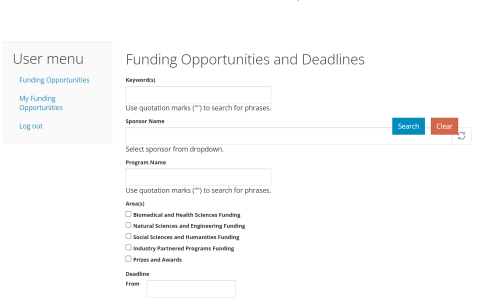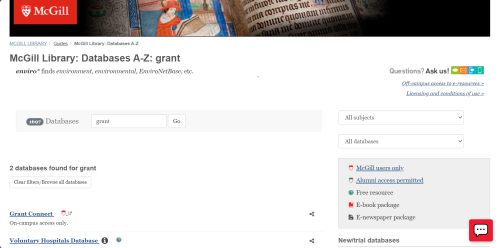Research and Innovation (R+I) Funding Opportunities Database
Are you seeking research funding? The R+I Funding Opportunities Database is a web-based platform that enables McGill Faculty and Staff to search, sort, and save upcoming research funding opportunities. You can explore various search criteria, including Programs, Keywords, Sponsors, Disciplines, and Deadlines.

McGill’s academic and administrative staff members can access the database using their McGill email address (first.last [at] mcgill.ca) and password. Affiliated McGill members can request access by emailing info.osr [at] mcgill.ca. Each request will be reviewed on a case-by-case basis.
Click this link : R+I Funding Opportunities (mcgill.ca) to access the database
For any issues related to the R+I Funding Opportunities Database, please email info.osr [at] mcgill.ca.
Grant Connect
Grant Connect is a bilingual database that offers detailed and searchable information on thousands of major funders. Here’s how it can assist McGill faculty members in their grant-seeking endeavors. It provides a wealth of data about various funding opportunities. Faculty members can explore details related to grants, scholarships, and other financial support available for research and innovation projects.
Users can search based on specific criteria such as program names, keywords, sponsors, disciplines, and deadlines.
Access via McGill Library
Grant Connect is accessible through the McGill Library website. Faculty members can utilize this resource while on campus. Please note that the database is only accessible on campus.

To access it, follow these steps:
- Connect to McGill’s on-campus wired or wireless network.
- Visit the McGill Library website
- Look for the Grant Connect link or search for it within the library’s resources.
Requesting Access
If you are a McGill faculty member, you can directly access Grant Connect using your McGill email address (format: first.last [at] mcgill.ca) and password. For affiliated McGill members who need access, please send an email to info.osr [at] mcgill.ca. Each request will be reviewed on a case-by-case basis.
Detailed steps to apply for a grant as a McGill faculty member
-
Internal Eligibility Check
- Once your grant proposal is approved, there is an internal eligibility step. A fund holder (usually a tenure-track researcher) must accept responsibility for managing the award on your behalf, even if you are listed as the project lead.
- If you have a different status, we may need to verify with the Faculty.
- The fund holder will need to sign a Research Funding Checklist (RFC), along with their Departmental/Faculty signatories.
- Additionally, provide a copy of the full grant proposal, including the budget and all forms.
-
OSR Submission
- Submit the required documents to the Office of Sponsored Research (OSR) at least 3 business days before the sponsor deadline.
- OSR will review the documents and provide approvals and institutional information as needed.
-
Budget Considerations
- Ensure that your budget includes indirect costs at 12% of the direct costs. This is the maximum allowed by the sponsor (McGill’s normal rate is 27%).
More details on budget
-
Indirect Costs (Overhead)
- Indirect costs (also known as overhead) are expenses that are not directly tied to a specific project activity but are necessary for the overall functioning of the research institution.
- These costs include items such as administrative support, utilities, facilities maintenance, and compliance with regulations.
- For your grant proposal, ensure that you allocate 12% of the direct costs to cover indirect costs. This percentage is the maximum allowed by the sponsor.
- Note that McGill’s normal indirect cost rate is 27%, but for this specific sponsor, the maximum allowable rate is 12%.
-
Direct Costs
- Direct costs are the expenses directly associated with the research project. These include items like personnel salaries, equipment, supplies, travel, and participant incentives.
- Make sure to calculate your direct costs accurately and allocate the appropriate portion for each budget category.
-
Budget Justification
- Along with the budget, provide a budget justification that explains the rationale behind each cost item.
- Clearly articulate how each expense contributes to the successful execution of your research project.
- If any specific costs deviate significantly from the norm, justify those deviations in the budget justification.
-
Review and Approval
- Once you’ve prepared your budget, ensure that it aligns with the sponsor’s guidelines and the specific requirements of your project.
- Seek input from colleagues, mentors, or your department’s research administration office to validate the accuracy and appropriateness of your budget.
- Obtain necessary approvals from relevant parties (such as the fund holder and departmental signatories) before submitting your grant application.
-
Institutional Signatures
- If any letters or forms in your proposal require institutional signatures, these must be provided by an authorized signatory via OSR.
- Note that McGill professors are not authorized signatories for grant applications.
-
Grant Agreements
- OSR will also coordinate the review and signature of any grant agreements received from the foundation.
-
- Ensure that your budget includes indirect costs at 12% of the direct costs. This is the maximum allowed by the sponsor (McGill’s normal rate is 27%).
Arts Grant Application Assistance
| Research support team | Contact |
|---|---|
|
Iris Godbout
|
iris.godbout [at] mcgill.ca (Contact us) |
|
Kathleen Holden
|
kathleen.holden [at] mcgill.ca (Contact us) |
External Resources
► Social Sciences and Humanities Research Council
► Fonds québecois de la recherche sur la culture et la société
► Canada Foundation for Innovation
► Canadian Institutes of Health Research
► Natural Sciences and Engineering Research Council of Canada